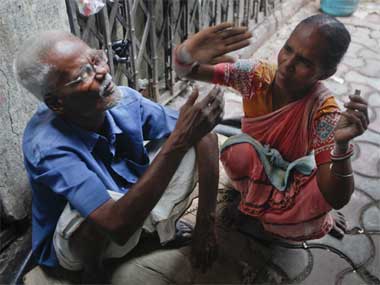By Seetha
In what could further roil the bitter poverty debate in India, a government survey shows that close to 99 percent of Indians say they are getting two square meals a day.
This could also beg the question - is there a need for a universal food security legislation, as the UPA seems so keen on legislating?
[caption id=“attachment_655029” align=“alignleft” width=“380”] This is a sample survey covering a little over one lakh households across different income and social groups in rural and urban India, and not a census, where each and every household is covered.Reuters[/caption]
The National Sample Survey (NSS, 66th Round) on Perceived Adequacy of Food Consumption in Indian Households shows that the proportion of rural households saying they are getting two square meals a day throughout the year has increased from 94.5 percent to 98.9 percent between 1993-94 and 2009-10. The proportion of urban households saying the same increased from 98.1 percent to 99.6 percent.
Correspondingly, there has been a decline in the proportion of households saying they did not get two square meals in any month or got it only in some months. Only 0.2 percent of rural households said that they did not get two square meals in any month in 2009-10, against 0.9 percent in 1993-94. In the urban areas, no household said it did not get adequate meals in any month in 2009-10, against 0.5 percent in 1993-94.
These figures will be laughed out by all of us who know that there are a lot of people going hungry out there. If the survey is right, we may well ask, how come India ranks 65th in the Global Hunger Index, below Sudan, Rwanda and Burkina Faso? Can 355 million people who get to spend less than Rs 30 a day on food, medicines and education actually say they get adequate food?
Let’s get things in perspective. One, the survey isn’t about any income or poverty line drawn arbitrarily by economists ensconced in ivory towers. Nor is it based on hard data on certain indicators, as in the case of the Global Hunger Index. It is a perception-based survey. That is, households were asked whether they had two square meals a day every day throughout the year.
The survey, the report points out, did not set any standards of food adequacy. “How much and what kind of food should be considered as adequate was left to the informant’s judgment.” So it is possible that for some people, just two dry rotis with an onion could be one square meal. Getting this twice a day will be two square meals. So let’s factor that skew in.
Two, this is a sample survey covering a little over one lakh households across different income and social groups in rural and urban India, and not a census, where each and every household is covered. So it’s quite possible for 99 percent households to say that they are getting two square meals a day and for large numbers to face near-starvation conditions.
The right way to look at the survey is to see it as the trend over different time periods. The increase in the number of people reporting that they get adequate food throughout the year and the decline in those who say they don’t is steady (see table below). So in each survey, the first category has increased and the second decreased bit by bit.
[caption id=“attachment_655030” align=“aligncenter” width=“509”] Table[/caption]
It is this that is important, regardless of what the poverty industry would like us to believe - that we are going downhill. Just as it is important to see that irrespective of the formula used to estimate poverty, there has been a significant reduction in poverty levels in recent years.
Disaggregated data in the survey shows that some sections are still not better off than others. In rural areas, agricultural and other labour accounted for a higher share of those saying they did not get adequate meals all through the year. In the urban areas, casual labour and the self-employed (hawkers, rickshaw pullers, cobblers etc) accounted for a larger share of the same category. Similarly, scheduled castes and tribes form a larger proportion of this category in both the rural and urban areas.
Wouldn’t, then, it be better for any food security legislation to focus on these categories rather than including people who may be getting more than two proper square meals a day?
In four states - Gujarat, Haryana, Madhya Pradesh and Tamil Nadu - more rural households than urban households said they got two square meals a day throughout the year. The report doesn’t give any reasons for this, but this could be either because people may be growing their own food in rural areas or social support systems are more robust in villages than in towns.
There’s a wake up call in the report for those ruing the dismantling of the socialist-influenced economic management in 1991. West Bengal, with its three uninterrupted decades of communist rule, had the lowest number of rural households saying they got adequate food through the year - 95.4 percent. Even Odisha did better with 96 percent. The proportion of agricultural labour households in West Bengal reporting that they did not get adequate food was 6.9 percent. Only Manipur and Odisha did worse in this respect.
The states with the highest proportion of families saying they got adequate meals through the year are, predictably, the high growth, investment friendly states - Andhra Pradesh, Gujarat, Haryana, Karnataka, Maharashtra, Rajasthan (where 99.8 per cent of rural households and 100 percent of urban households said they were satisfied) and Tamil Nadu.
There’s a lesson in this, isn’t there?
Seetha is a senior journalist and author


)
)
)
)
)
)
)
)
)



